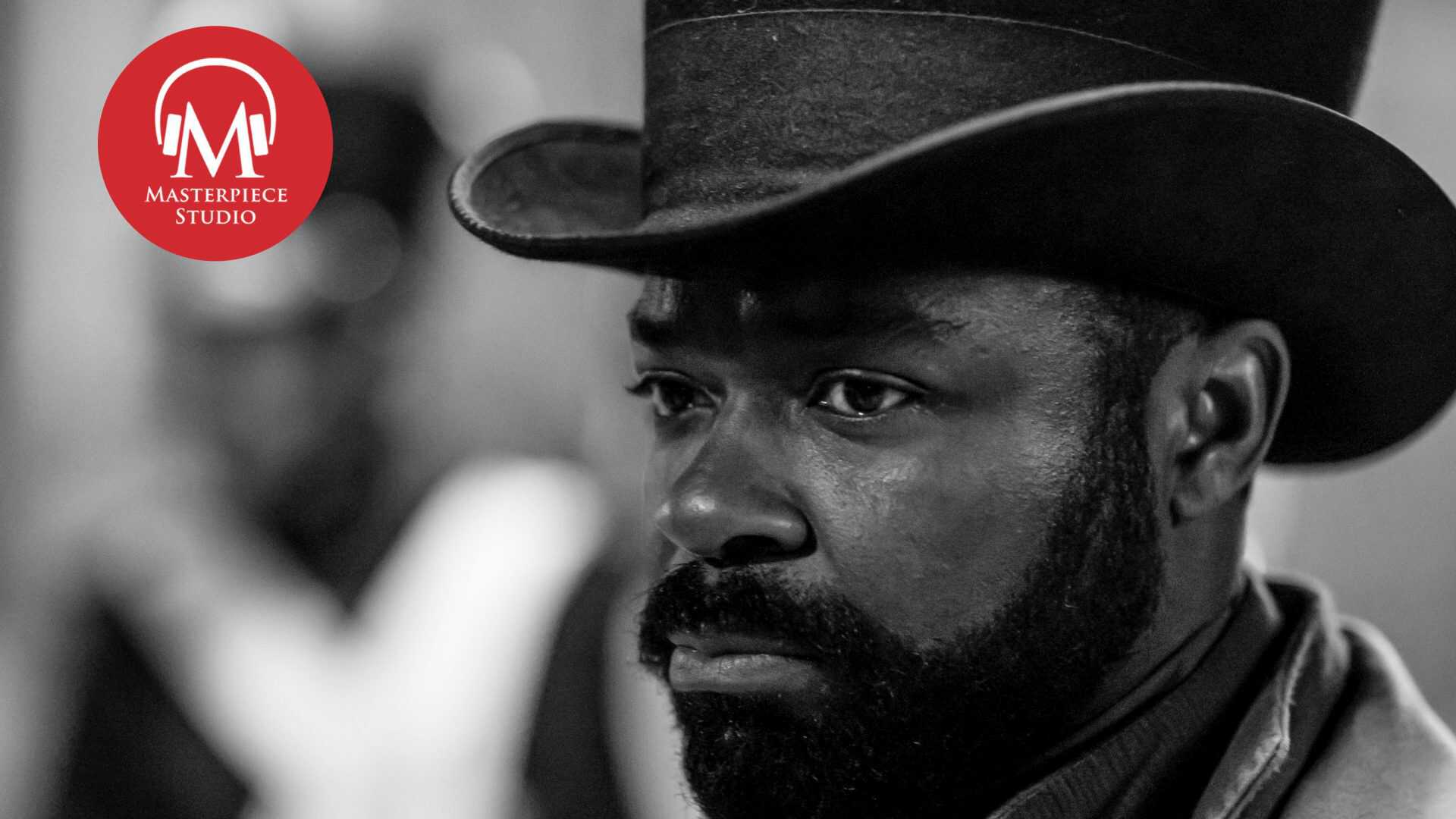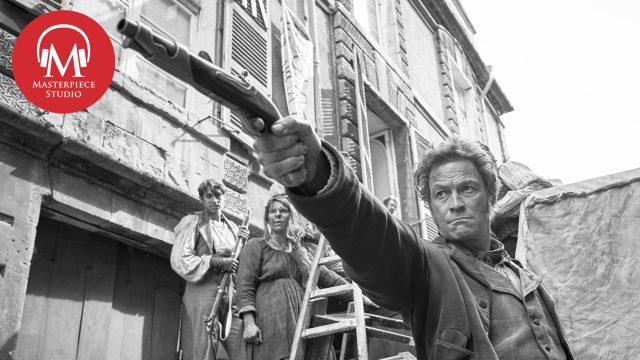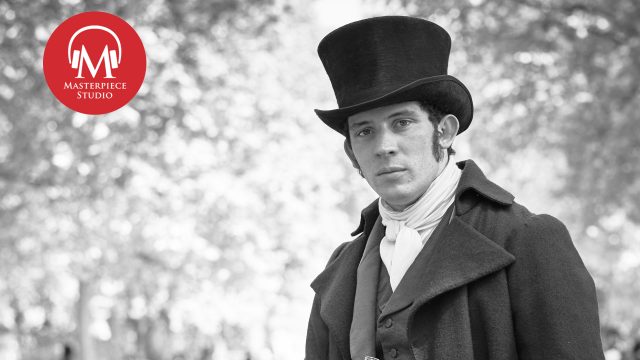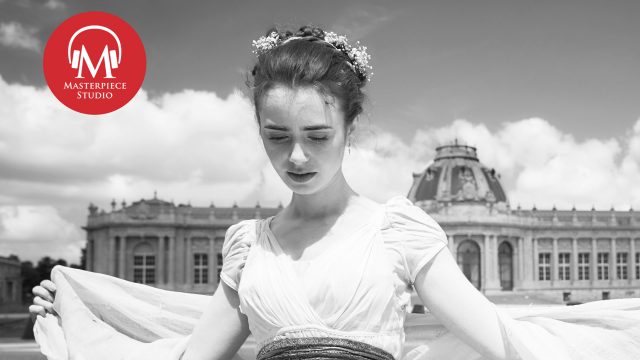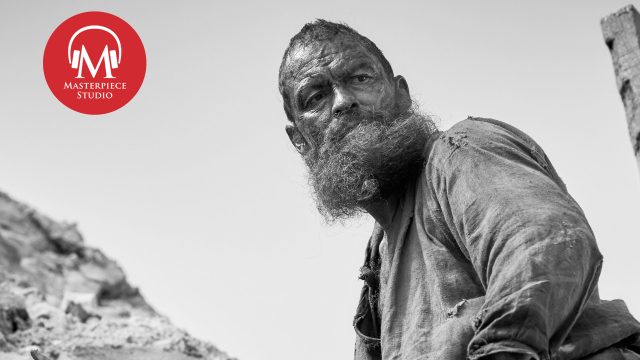In Victor Hugo’s landmark epic, Les Miserables, the Inspector Javert is a hard, cold man with a unflinching pursuit of his own personal justice. But in the critically-acclaimed new MASTERPIECE adaptation of the novel, actor and series executive producer David Oyelowo brings a subtle, sophisticated nuance to his performance, adding layers of context to this memorable villain. He joins the podcast for a preview of the villainy still to come in this critically acclaimed series.
Download and subscribe on: iTunes | Spotify| RadioPublic
Transcript
Jace Lacob: I’m Jace Lacob, and you’re listening to MASTERPIECE Studio.
When Jean Valjean reinvents himself as ambitious factory owner Pere Madeleine, the mayor of Montreuil, his longtime nemesis, Inspector Javert, is close behind. Years after leaving his post at the prison, Javert is rather unexpectedly Montreuil’s new police inspector.
CLIP
Javert: Monsieur le Maire. I thought we should become acquainted. My name is Javert.
Jace: Javert doesn’t immediately suspect the noble mayor to be the escaped convict from his past. But his obsessive attention to detail — and Valjean’s superhuman strength — gives the Inspector the clues he needs to successfully connect the dots.
CLIP
Javert: I denounced you to police headquarters in Paris. I suspected you, wrongly, as it turns out, to be a notorious felon, once known to me as Prisoner Number 24601. A man named Jean Valjean.
Valjean: But you were wrong.
Jace: Actor David Oyelowo wasted no time in poring through Victor Hugo’s massive epic, using Javert’s narrative arc to inform his performance on screen in MASTERPIECE’s new adaptation of Les Misérables. Even so, Javert’s hidden depths often surprised him.
David Oyelowo: You may not like him you may not love him you may not even fully understand him but you will have context for why he is the way he is and why he does what he does.
Jace: Oyelowo joins us to talk Javert, his pursuit of Valjean, and Javert’s moral absolutism.
Jace: And we are joined this week by Les Misérables star and executive producer David Oyelowo. Welcome.
David: Thank you. Hi.
Jace: Is it true you were initially slightly reluctant to take on the role of Javert?
David: Reluctant only because of my perception of the character. Nothing to do with the novel. I hadn’t yet read the mini series, and it was more to do with the musical. I love the musical, and I enjoy Javert in it. But you know, for me, he sort of comes off as one dimensional, you know, the villain, the baddie, and I never really understood what his beef with Jean Valjean was, on the basis of the musical. So for me I’m always looking for material and characters that have a density to them that means I have to kind of dig deep to find the character. And so I think I had wrongfully thought of the character as one dimensional, purely because I’d only seen him in the context of the musical. When I read the miniseries, there was just so much more going on so many more layers so much more understanding of why he is the way he is. You may not like him, you may not love him, you may not even fully understand him, but you will have context for why he is the way he is and why he does what he does. That character represents a sort of Old Testament need for what he thinks of as right and wrong. And that’s because he was born in prison to criminal parents, hates that part of his history and he’s doing everything he can to push that away from himself and Jean Valjean represents what he might have been without the revelation as he sees it of right and wrong. And so that you know very much he is the ying to Jean Valjean’s yang when it comes to redemption, in terms of Jean Valjean, and the law in terms of Javert.
Jace: I mean he is an antagonist to Dominic West’s Jean Valjean, but there is this sort of inexplicable chemistry between the two that seems in these first two episodes to be almost psychosexual.
CLIP
Javert: Men like us have only two choices — to prey on society, or to guard it. You chose the former, I chose the later. And I can tell you, if I’d chosen to be a criminal, I would’ve been a hell of a lot better one than you turned out to be. Nineteen years for a loaf of bread.
Jace: What do you make of their dynamic?
David: It’s actually known that Hugo based Jean Valjean and Javert on the same person the same guy had these qualities in him as one individual. And that was the inspiration. And I think that’s the masterstroke of Les Misérables is that even though in the novel and in our show they are two different people. They are inexorably linked because they very much reflect each other. Jean Valjean really finds it difficult to embrace the idea of his own redemption. Javert insists that redemption is impossible for a criminal and so the fact that you have these very different, yet hemispherical similar mindsets around redemption means that these two characters hover around each other in a way that is truly fascinating.
Jace: Their cat and mouse relationship propels much of the story engine of Les Misérables. What was it like working with Dominic West and what did he bring to the role of Jean Valjean?
David: Well Dominic brought a deep level of emotional intelligence to the piece, and what I mean by that is there is nothing about his performance that is purely technical. It is felt. It is lived in. It feels real. It is layered, and it is ultimately human. And so that is very much what I needed and what Javert needs in order for his character to work because there is something inhuman, there is something cold there is something that is on the surface with Javert in relation to Jean Valjean. And the thing that that Jean Valjean does to Javert is to chisel away at him to the point where by the end of the story there are just enough glimpses of humanity in Javert that become unbearable for him to admit which is why he meets his sort of famous end in terms of the story. And so Dominic did a lot of my work for me by being such a human Jean Valjean.
CLIP
Javert: I’m told you have restored the prosperity of the town by giving employment to all those who are willing to work. Consequently, there’s very little crime here.
Jean Valjean: Yes I like to think that that is so.
Javert: But a thief does not steal because he’s poor and desperate. He steals because he has a criminal mentality. Because he is a degenerate. Because he is, to put it simply, wicked.
Valjean: Well there I have to tell you that we disagree.
Jace You mentioned the Old Testament before. Why are Javert’s notions of good and evil so clear cut?
David: Because he grew up in prison. Because he grew up in a black and white environment. He grew up surrounded by criminals and prison guards. His parents were criminals and so therefore he had to figure out which he was in that environment. Am I a criminal or am I going to be on the side of the law. He did not grow up in an environment where there was a gray area. And so he chose to be part of the law keeping community. And the notion that this guy, Jean Valjean, who is a criminal, who has been in prison for 19 years is now going to segue way into some kind of gray area because he is gifted or has humanity is just a confusion for Javert. And that’s why he is obsessed with this guy because he finds him fascinating, repugnant, and also is attracted to him.
Jace: Does he represent do you think an Old Testament sense of retribution, sort of one that is diametrically opposed to Jean Valjean’s more Christ-like virtues?
David: Absolutely and not only retribution but judgment. You know he has no problem in in saying that person is a criminal, and so therefore they deserve this punishment. Jean Valjean, the fascinating thing about him is he would agree with Javert. It’s just that he has been afforded the kind of kindness that means he has hope. He feels if I transplant myself elsewhere, maybe there is hope for me to have a better life. Maybe there is hope for me to have happiness, maybe even love in my life. And we go on to see that in an unexpected way with Cosette, who becomes a daughter, a companion, a family member all things that we haven’t seen Jean Valjean have. But the tension for him is that he also feels, ‘Do I deserve forgiveness? Do I really?’ But that’s kind of what’s beautiful about him. He doesn’t suddenly think, ‘Oh I’m righteous I’m forgiven. I’m a saint.’ He is perpetually made aware by himself of his fallen state. And so he’s constantly trying to stay on the straight and narrow.
Jace: Javert becomes the new chief of police in Montreuil where Valjean has reinvented himself as Père Madeleine, the city’s upstanding new mayor. Does Javert recognize him instantly in that first meeting?
David: In that first meeting the great great question and is one we debated time and again, on the basis of the book, but also what is the audience going to believe? And my belief and certainly how we played it is that there is recognition but it takes a while to fully assimilate how the other has changed because time has passed. The power dynamic is very very different. Suddenly this guy who I was a prison guard over is now a mayor. And yes I have become a chief of police but he’s the mayor. And so that dynamic shift means that yes there’s recognition. But who are you now, and what does that mean? And can I think of you the way you once were? And if I do, what does that mean? So that’s also part of the cat and mouse it’s not just chasing each other down. It’s where are we now in the social strata and what does that mean for our individual survival.
Jace: I mean I love that scene because there is this beautiful ambiguity to it to his reaction and it becomes clear over the course of that that he is maybe going to torment him, that he’s needling him a little bit. I mean why doesn’t he come out and identify him as 24601 rather than just toy with him over these next scenes?
David: Because as we see through the course of the show, status matters. You know, the whole reason for this revolution is because the upper class have a very unfair advantage of the lower class and it’s the kind of advantage that literally is the difference between life and death as we see with Fantine. And so in a society where how you navigate class dictates your survival means that you cannot afford to show your cards early in relation to that game. And so that’s why Javert has to bide his time. Figure out where his power play lies. And as we see through the course of the show he continues to play those those power moves.
Jace: And I love that he gives his mission statement as pursuing not only the obvious offenses but the hidden ones not only in the present but the past. I mean that is sort of a statement of detecting sin.
David: Yeah. And what and hints at why he is inexorable. You know the fact that, ‘I will get you. I am patient, and I believe my patience, combined with my righteousness, combined with the fact that I’m right, means that you will go down.
Jace: Valjean risks exposure to rescue the man trapped under the cart, a mirroring of the scene in the quarry when he uses his extraordinary strength to free the soldier. Javert pushes Valjean to see if he can lift it. Is this man’s life worth the price of exposing Valjean?
David: Absolutely, for Javert. Absolutely. I mean we see in the demise of Fantine, how callous Javert can be in relation to getting to what he deems to be the truth. There is no price not worth paying in order to get to the truth, as far as he’s concerned.
Jace: I mean he’s so horrifically proud of himself in this moment that he has manipulated the situation to entrap him and he doesn’t for a second even consider helping Valjean which I thought was possibly revealing of Javert and his own motivations. He’s willing to sort of stand back and wait instead of jumping in.
David: Well there’s also an element to this whereby, Javert has embraced the fact that there is a hierarchy in society. He’s not going to get off his horse and get muddy and dirty with the peasants, you know? And even in the earlier moment where the prison guards were trapped under rocks. You know, he absolutely holds on to every vestige of status he has within society, because that’s the rules of that society. That’s what it was built on. Which is why a revolution was necessitous to break down that strangulation upon the population, which was social class and people lording it over other people. He in some ways is very much a product of that society.
Jace: Before this next question, a brief word from our sponsors…
Jace: Javert travels to Paris to inform the police that Jean Valjean is posing as a mayor only to be told that another man believed to be Valjean has been arrested four days earlier and he scolded for making a false accusation against an important public figure. Why is this encounter so humiliating for Javert?
David: Because Javert thinks he’s doing his job well and unfortunately for Javert, the opinions of the higher ups mean more to him than I think he’d care to admit. So to have done what he deems to be good detective work of finding the man who robbed Petit Gervais, this little boy, and the man who was in prison for 19 years for stealing a loaf of bread and who in terms of Javert’s mentality should probably have died in prison for stealing a loaf of bread, ‘I am now here giving you on a platter that mindless unthinkable criminal.’ And for that to be thrown back in his face, not only in his face period, but in his face because that very prisoner is now of a higher status is just such anathema that it is probably the thing that refuels his pursuit of Jean Valjean to the degree that we see.
Jace: Javert is so convinced of Valjean’s brutality and evil that he’s gobsmacked when Valjean steps in to protect Fantine from prosecution.
CLIP
Javert: A common whore? She is the lowest of the low. You would risk your good name to help a creature like that?
Jean Valjean: She is one of God’s creatures, Monsieur Javert. And she has suffered grievously through no fault of her own. I injured her myself, and now I want to make amends if I can.
Javert: You astonish me.
Jean Valjean: Now stand out of my way!
Jace: Does this action fly entirely in the face of Javert’s philosophy?
David: You could argue, yes. Either there’s a hypocrisy to it, but it also shows what he deems status to mean. ‘You are the mayor. Why would you spend any time dealing with this prostitute? Don’t you know which level of society you have achieved? You are a disgrace to your status to do that.’ And so there is a hypocrisy to it because you know if you’re a very rich man and you’re a criminal you should go down. But I’m not sure that Javert would concentrate as much on rich criminals as he does poor criminals. The reason being Javert hates himself. He hates that he was born in prison. He hates that he was born to criminal parents he hates that he was born poor. So he’s constantly trying to kill himself. The existence of any vestige of himself is what he wants to expunge. Which is why he ultimately ends up the way he does.
Jace: Why does Javert offer Valjean his resignation of chief of police. Is this just another manipulation? Is it part of the game?
David: Oh it’s another trap. He’s setting another trap for him which works. You know, Jean Valjean turns up to the courthouse because Javert has very successfully used emotional blackmail. ‘Here’s this prison guard who has now become chief of police who’s now deciding to quit because of my lies, and there’s this other guy out there who’s now about to go down because of my lies.’ You know how I’m the thing that Javert can’t afford to admit to himself is that he sees a morality in Jean Valjean that he trades on. He knows that he is trying to be good just enough that he may well turn up to try and exonerate someone who is unfairly being prosecuted, and it works.
Jace: I mean, Javert is so consumed by issues of crime and punishment that his life seems otherwise empty despite the sort of frisson that exists between Javert and Valjean. He’s almost asexual and we don’t see any interest from him romantic or otherwise. I mean what were your intentions in terms of depicting any sense of his inner self?
David: I feel like he has dedicated himself entirely to the law. That’s what he’s in love with. That’s what he is married to, and that’s why he is hollow. Because that can’t give back that can’t love you back. That ultimately cannot fulfill. And so that why he is asexual, he is neutered by his own choices in a sense which is why he’s a really fascinating character because literally what he doesn’t realize is that if he were to kill Jean Valjean his reason for being alive would be expunged. He would, he would be at sea which is what happens in those 10 years where Jean Valjean is hiding out in the convent. He loses himself and we see the reinvigoration of himself when Jean Valjean reemerges into the story and that’s a real tragedy. To get your sense of being out of the pursuit and hoped for revenge towards another person.
Jace: And we’re currently in a time of unrest politically and socially. There are issues of race and wealth, inequality and marginalization. Marches and protests have become the norm. I mean are there obvious parallels to be drawn between Les Misérables in the world in which we’re currently living?
David: Yes it’s very unfortunate that the world of the early 1800s that Hugo was alluding to we are definitely here again 200 years later. And that’s to do with the fact that as human beings we are wired a certain way and we are as capable as love as we are of hate. And that’s just I don’t know that we’re ever going to fully learn the lesson is the truth of the matter. But what I think Les Misérables does a brilliant job of is showing love humanity redemption within the characters within the individuals within the society. And that is where hope lies. Because yes we’re in a time of egregious unrest racially socially economically. But the reason why we still have hope is those moments where not necessarily in the news but you see someone who does something loving who thinks beyond themselves who somehow rises above all of that darkness and it gives you the fuel to keep going. Fantine represents that in this story the fact that she was prepared to give her hair, her teeth, her all for the sake of her daughter’s well-being. You know the fact that Jean Valjean can find redemption from this priest who he never met before who he stole from and who can forgive him not only forgive him but say take it it’s yours just now know that you can be better from here on out. I mean these are the things that in the midst of all the crazy keep us going.
Jace: You once said that you won’t do superhero movies or play the black best friend. What are the metrics that help you choose your roles? Is there an element of activism to it?
David: Activism as in the fact that you know images are political and you have to accept that if yours is the blessing to portray characters that millions of people get to see potentially and sometimes literally that is going to have an effect. And so I just try to be very mindful of the of the work I do in relation to the fact that you know it colors how people perceive who and what a person like me is. But you know that comment is borne out of just recognizing that unfortunately wrongly or rightly so much of how we perceive humanity is often literature, movies, television. And so I would just want to make sure my part of it is a good reflection.
Jace: You shot to fame with your turn as Danny Hunter on espionage drama Spooks opposite Keeley Hawes and Matthew McFadden. This show opened a lot of doors for you. What was it like working on Spooks and what effect it had on your career?
David: Oh it was huge because up until then I had primarily been a theater actor. And that was the show on which I really learnt screen acting. But also it was successful in the kind of way that gave me a degree of recognition, and notoriety that led to movies. And you know, I’ve been riding that wave ever ever since. In a way it also was my first meaningful interaction with the BBC, and laid the foundation for Les Misérables which we’re talking about right now. So you know, it was it was a very, very formative opportunity for me about.
Jace: Your turn as Martin Luther King in Selma earned rave reviews. One reviewer said that it was ‘stirring, soulful, and deserving superlatives.’ Do you read your reviews?
David: No I don’t. Not anymore. I used to make the mistake of doing that. And you know, I mean it’s a cliche everyone says it but if you believe the good ones you have to believe the bad ones. But also as an actor, it’s it’s very cancerous I think to to pay too much attention to the opinions of others because actually I think great art comes out of the human spirit and feeling cold to something and being single minded about the pursuit of it.
Jace: You’ve worked now with Ava DuVernay on three films. What is it like working with her?
David: Yeah, she’s my creative soulmate. I mean, she somehow knows things about me that I’m not sure I fully know, when it comes to my ability to play characters and tell stories. She’s a brilliant writer and director, and she’s like a sister to me. So you know, it’s just one of those rare privileges to have found someone who you see eye to eye on everything when it comes to storytelling, and what you are aspiring to do. So I just feel very glad that we found each other.
Jace: You were directing your first film, a coming of age story called, The Water Man. Is directing a challenge that you’re relishing at this point in your career, and what made Water Man the ideal film for your directorial debut?
David: Yeah, it’s a prospect I’m hugely relishing. I I’ve written scripts I’ve obviously acted in them. I’ve produced movies now I’ve deliberately waited this long to direct because I think it’s a very hard and kind of magical role within the filmmaking process. That person who has all these balls in the air that somehow obviously with the help of very smart people they can somehow be the one to captain pulling it together into hopefully something not only cohesive but entertaining and hopefully something that stands the test of time. I feel ready for that challenge now and The Water Man is just a very beautiful story that is is about loss but it’s also about hope it’s about a child but it’s also about a father. It’s about so many of the things that I hold dear in my own life.
Jace: You’ve co-produced several projects with Oprah Winfrey including Selma and The Water Man. How would you describe your relationship with Oprah?
David: It’s more of a mother son relationship. Those things we produced together and many more that we will are born out of her being so supportive of me. She doesn’t need to produce anything with me. But she believes in me which is still something that slightly sticks in my throat. But I also really value her opinion and she’s a guiding voice in my life. And so it’s amazing to have her as someone who I personally love but also who professionally has been such an amazing support.
Jace: You brought Ava DuVernay on to Selma. You brought Amma Asante on to A United Kingdom. Is it a matter of generating opportunities for traditionally marginalized people?
David: Partly but also they’re brilliant. I mean I worked with Ava DuVernay on Middle of Nowhere, and just I just genuinely thought, ‘Wow, this lady is a genius.’ And we had been struggling to find a director for Selma. And so it was very apparent to me that she should at least be a candidate to me she was a no brainer. But you know I threw her name into the hat because I’d worked with her. It was the same thing with Amma Asante. I’d worked with her on a on a show called Brothers and Sisters, very soon after I left drama school but also I saw her film Belle which I had nothing to do with and was really struck by. And she just felt very right for A United Kingdom. So for me it’s not about quotas or it’s calling out injustice when you have talented individuals who have done work that warrants opportunity. And that’s not happening you know then surely if I have any degree of notoriety that’s a good use of it. And so that’s the way I think about it.
Jace: David Oyelowo, thank you so much.
David: Thanks for having me.
Jace: The young Parisian beauty, Fantine, has seen the light fade from her life. Her lover has left her, her daughter is being raised by strangers, and she’s taken to the streets of Montreuil, selling her body in order to pay the greedy family watching her child.
CLIP
Bamatabois: And how much do you charge, baldy?
Fantine: Whatever you think it’s worth, monsieur.
Bamatabois: How about nothing, then?
Jace: Now, as Fantine nears death in the care of Jean Valjean, actor Lily Collins reflects on what makes this particular adaptation of Les Miserables so different for her iconic and tragic character.
Lily Collins: I think she wants to believe that true love exists. And having not been in this situation before, when Felix woos her and knows exactly what to say and gives her the attention and says all the right things, seemingly, she sees that as love and she doesn’t have anything to compare it to.
Jace: Tune in to hear Collins on the podcast next Sunday, April 28.
MASTERPIECE Studio is hosted by me, Jace Lacob and produced by Nick Andersen. Elisheba Ittoop is our editor. Susanne Simpson is our executive producer. The executive producer of MASTERPIECE is Rebecca Eaton.
Les Misérables Podcasts 4 More Podcasts
MASTERPIECE Newsletter
Sign up to get the latest news on your favorite dramas and mysteries, as well as exclusive content, video, sweepstakes and more.








